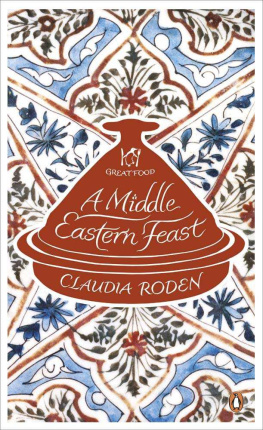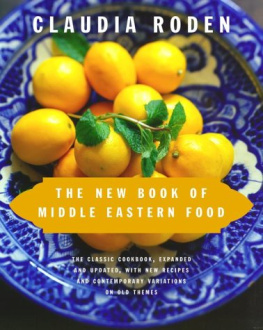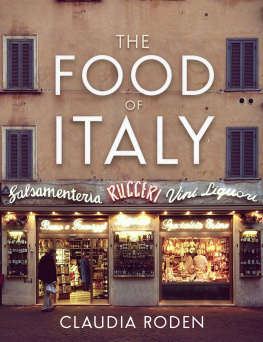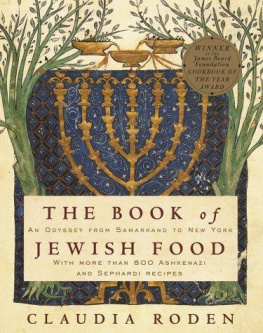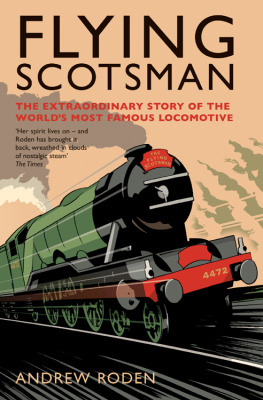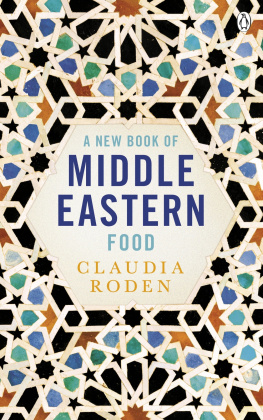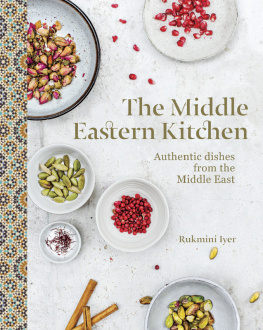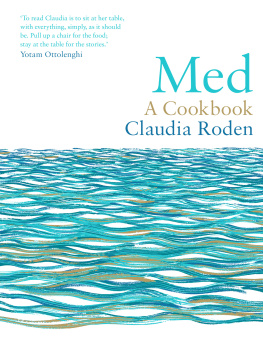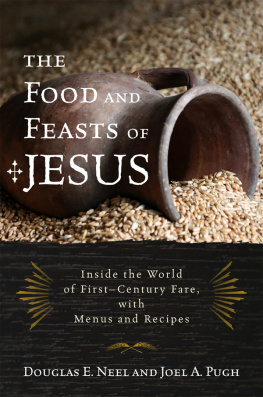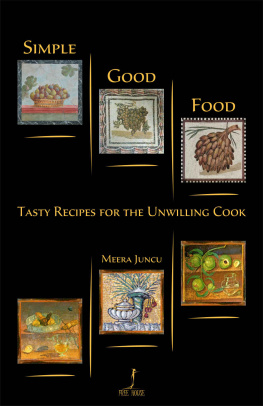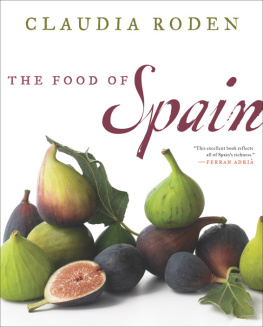Roden - A Middle Eastern feast
Here you can read online Roden - A Middle Eastern feast full text of the book (entire story) in english for free. Download pdf and epub, get meaning, cover and reviews about this ebook. year: 2011, publisher: Penguin Books Ltd, genre: Home and family. Description of the work, (preface) as well as reviews are available. Best literature library LitArk.com created for fans of good reading and offers a wide selection of genres:
Romance novel
Science fiction
Adventure
Detective
Science
History
Home and family
Prose
Art
Politics
Computer
Non-fiction
Religion
Business
Children
Humor
Choose a favorite category and find really read worthwhile books. Enjoy immersion in the world of imagination, feel the emotions of the characters or learn something new for yourself, make an fascinating discovery.
- Book:A Middle Eastern feast
- Author:
- Publisher:Penguin Books Ltd
- Genre:
- Year:2011
- Rating:3 / 5
- Favourites:Add to favourites
- Your mark:
- 60
- 1
- 2
- 3
- 4
- 5
A Middle Eastern feast: summary, description and annotation
We offer to read an annotation, description, summary or preface (depends on what the author of the book "A Middle Eastern feast" wrote himself). If you haven't found the necessary information about the book — write in the comments, we will try to find it.
Roden: author's other books
Who wrote A Middle Eastern feast? Find out the surname, the name of the author of the book and a list of all author's works by series.
A Middle Eastern feast — read online for free the complete book (whole text) full work
Below is the text of the book, divided by pages. System saving the place of the last page read, allows you to conveniently read the book "A Middle Eastern feast" online for free, without having to search again every time where you left off. Put a bookmark, and you can go to the page where you finished reading at any time.
Font size:
Interval:
Bookmark:
PENGUIN BOOKS GREAT FOOD
A Middle Eastern Feast
CLAUDIA RODEN was born and brought up in Egypt. The publication of her Book of Middle Eastern Food in 1968 revolutionized Western attitudes to the cuisines of the Middle East. She continued to write cookery books with a special interest in the social and cultural background of the food. Her books have won her many awards. The Glenfiddich Trophy was given In celebration of a unique contribution to the food that we eat in Britain today; the Prince Claus Award for Culture of the Netherlands was in recognition of exceptional achievements. In 2010 the James Beard Foundation of America inducted Roden into the Cookbook Hall of Fame for the influence her first book has had on cooking in America.

PENGUIN BOOKS
PENGUIN BOOKS
Published by the Penguin Group
Penguin Books Ltd, 80 Strand, London WC2R 0RL, England
Penguin Group (USA) Inc., 375 Hudson Street, New York, New York 10014, USA
Penguin Group (Canada), 90 Eglinton Avenue East, Suite 700, Toronto, Ontario, Canada M4P 2Y3 (a division of Pearson Penguin Canada Inc.)
Penguin Ireland, 25 St Stephens Green, Dublin 2, Ireland
(a division of Penguin Books Ltd)
Penguin Group (Australia), 250 Camberwell Road, Camberwell, Victoria 3124, Australia
(a division of Pearson Australia Group Pty Ltd)
Penguin Books India Pvt Ltd, 11 Community Centre, Panchsheel Park, New Delhi 110 017, India
Penguin Group (NZ), 67 Apollo Drive, Rosedale, Auckland 0632, New Zealand
(a division of Pearson New Zealand Ltd)
Penguin Books (South Africa) (Pty) Ltd, 24 Sturdee Avenue, Rosebank, Johannesburg 2196, South Africa
Penguin Books Ltd, Registered Offices: 80 Strand, London WC2R 0RL, England
www.penguin.com
A Book of Middle Eastern Food first published 1968
Revised edition, A New Book of Middle Eastern Food, first published 1985
This extract, with a new introduction, published in Penguin Books 2011
Copyright Claudia Roden 1968, 1985, 2011
All rights reserved
Cover design based on a pattern from a seventeenth-century Tranian dish. Fritware with polychrome underglaze painting. (Photograph copyright Victoria & Albert Museum.) Picture research by Samantha Johnson. Lettering by Stephen Raw
Except in the United States of America, this book is sold subject to the condition that it shall not, by way of trade or otherwise, be lent, re-sold, hired out, or otherwise circulated without the publishers prior consent in any form of binding or cover other than that in which it is published and without a similar condition including this condition being imposed on the subsequent purchaser
ISBN: 978-0-14-196601-4
I started collecting recipes for A Book of Middle Eastern Food when Jews left Egypt after the Suez crisis in 1956. I was at art school in London, and my parents followed my brothers and me there. During the next decade I saw waves of relatives and friends who stopped over in the city. Everyone was asking for recipes and offering theirs. We might never see each other again, but we would have something to remember each other by. The women who gave me recipes were, like my mother, in their late forties and older. They said that they had them from their mothers and grandmothers. So the ways of cooking had not changed for at least a hundred years. I took down everything they said: you know that there is enough flour when the dough feels like your earlobe; rub the toasted hazelnuts with your hands then go out in the garden and blow the skins off; mince the meat three times through a fine mincer then pound it to a paste. Every recipe was precious. There had been no cookbooks in Egypt, and we were all concerned with keeping a link with the life we left behind.
Egypt in our time had been a very mixed cosmopolitan society in the cities (it was the time of King Farouk and I saw in Gamal Abd el Nassers revolution). There were long-established communities of Armenians, Greeks, Italians, Syrians and Lebanese, as well as expatriate French and British communities. Our royal family was an Ottoman Albanian dynasty and our aristocracy was Turkish. The Jews were also mixed. My grandparents came from Syria and Turkey, and there were families from North Africa, Greece, Iraq and Iran. When we ate at friends homes we enjoyed a range of dishes from various countries. That is why I ended up covering most of the Middle East.
We were very Europeanized. We spoke French at home and Italian with our nanny. At the English School in Cairo we studied English history and geography, nothing at all about Egypt or the Arab world. But generations of my family had lived for hundreds of years an integrated life in the Arab and Ottoman worlds, and something of their sensibilities, experience and knowledge filtered down to us. It was those worlds that captivated me the part of my culture that I hardly knew, which belonged to my parents, especially my father that I wanted to recapture. That is why I filled the book with Arab proverbs, riddles, tales and poems about food. I am sometimes asked how a Jewish woman can be fascinated with Arab food and culture. I reply that they were also ours and we were part of it.
At the British Library I found a translation of a thirteenth-century culinary manual from Baghdad, accompanied by poems celebrating food translated by Professor Arberry, and a social analysis by the French orientalist Maxime Rodinson of a culinary manuscript of the same period from Damascus. Some medieval recipes had similar names, similar combinations of ingredients and flavourings, and similar techniques to those I had been hearing from the people who were giving me their recipes. I was enthralled. For months I entertained friends with medieval banquets. That is how I became interested in the history of food.
After the publication of the book, people always talked to me about food. Those who came from the Middle East revealed their passions for particular foods and offered culinary secrets. I was invited to eat and to watch people cook and I had correspondents in different countries. My pockets were full of cooking instructions acquired at chance meetings, and my drawers were full of recipes written in different hands. I also had many opportunities to travel in the Middle East. I went on collecting recipes and researching the background of the dishes. The new material went into a 1985 edition entitled A New Book of Middle Eastern Food. The extracts in this little book are from that edition.
Although I made some changes and additions throughout the 1985 edition, I left the recipes as they were with the voices and idiosyncrasies of those who gave them. The amateur way in which they are described reflects the rich and varied character of very personal and much-loved cooking traditions passed down through generations in the family. It was cooking without gadgetry. Even when I was trying out the recipes there were no food processors or blenders. In the second edition, after explaining a laborious method, I sometimes added that you could do it all very quickly and easily with a food processor. That is what I suggest you do when you need to blend something to a paste.
The history, tales poems and proverbs are not included in this book. The editors chose to feature only the narrative extracts that are in my voice. That voice is the one I had as a young woman whose mother tongue was French, beginning a new life in a new world and missing the old one, writing to record a lost heritage in a country where people asked if Middle Eastern food was about sheeps eyes and testicles.
Next pageFont size:
Interval:
Bookmark:
Similar books «A Middle Eastern feast»
Look at similar books to A Middle Eastern feast. We have selected literature similar in name and meaning in the hope of providing readers with more options to find new, interesting, not yet read works.
Discussion, reviews of the book A Middle Eastern feast and just readers' own opinions. Leave your comments, write what you think about the work, its meaning or the main characters. Specify what exactly you liked and what you didn't like, and why you think so.

